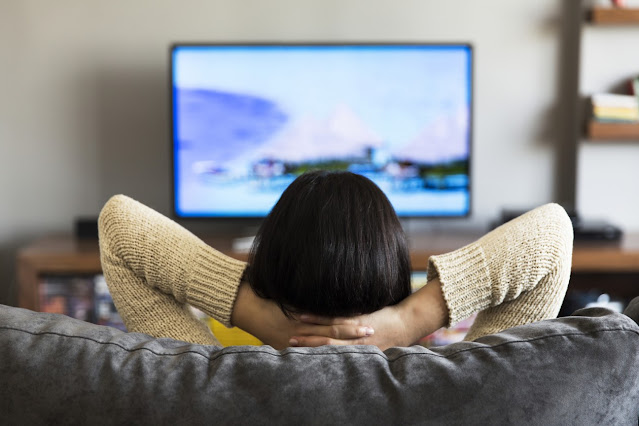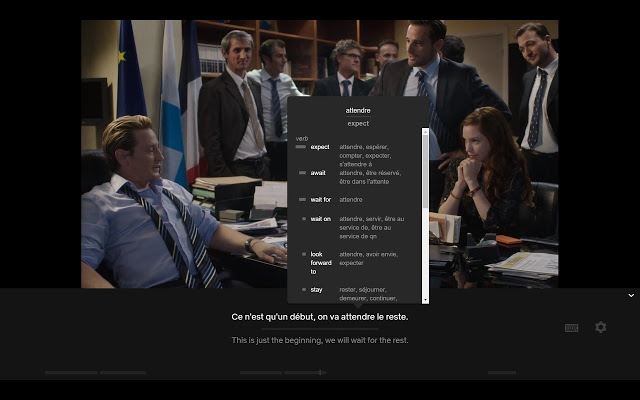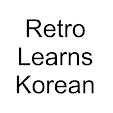Related video for extra viewing:
A lot of learners often ask questions around the use of subtitles and whether they should be using native subs, target language subs or just foregoing subs altogether. The answer can vary depending on your reasons for watching and also your level. Subtitles are a great resource for learning new words while being able to relax more than pure reading but also have the added visual queue in which to understand the words on screen. Let's go over a few different ways you might consider watching content in your target language
 |
| Just sit back and relax |
Native language subtitles
Probably the most underrated way of watching, especially for those in the beginning stages. You get to hear the language and become accustomed to spending part of your day with your target language without sacrificing any enjoyment that comes from having 100% comprehension. I highly recommend using native language subtitles for anyone just starting and even those in the beginning stages.
The biggest advantage to using native language subtitles is having a library of content that you fully understand, which by the time you come to re-watching later on, will likely remember a lot of the dialogue that took place. There are a few other advantages that even more advanced learners can make use of. Being able to see translations for various phrases that you already know helps you think more about the actual meaning rather than the literal translation, which helps you think more about how you could use those phrases in the situations you are seeing on screen.
Obviously there are a few disadvantages to using your own native subtitles otherwise we might see a lot of anime nerds with a high level of Japanese from their 10 years of watching. If you don't put any effort in beyond watching you will likely only pick up on a few exclamations and pronouns. It's extremely hard to listen beyond the subtitles and try to hone in on the listening but it's natural for the brain being a lazy being to do whichever is easiest. In the long term it is better to move on from native subs as soon as you can as to not get addicted to the 100% comprehension that comes with using your native language.
 |
| Yes, this speaks to me |
Subtitles vs no subtitles? Why not both?
Lately there has been a rise in popularity of using dual subtitles while watching with subs apps as 'Language Learning with Netflix' which allow for two language subtitles to be placed on the screen at the same time. I find it hard to see any advantages to this approach other than being able to see the written form of your target and native language and compare. However I imagine this is way more effective for languages that are similar, as trying to use English subtitles with Korean or Japanese subtitles is going to be a disaster as most sentences will not match up as the word order is opposite.
The disadvantages with this one are pretty similar with using just native subtitles alone. You will have to put in a lot of effort to force yourself to read the target language subtitles on top of that you will have to spend more time focusing on reading text which will make it harder to listen. I imagine this method requires a lot of pausing to actually get the benefits but I don't really see the point of this method over choosing native or target language subtitles.
 |
| Probably more effective for language with the same word order |
Target language subtitles
This one is great for those who are using their watching time to learn new words and for languages that have harder writing systems so that you can match up the sound with the writing system. Similiarly languages like English that the writing system doesn't match up well with the sounds can really benefit from this method as you do not need to constantly guess how to read a word and get the pronunciation given to you. I highly recommend this for people who have a decent vocabulary and want to pick up more words while they watch tv shows.
Even simply watching with target language subtitles has disadvantages, we are definitely doing ourselves a disservice if the majority of our listening comes from watching with subtitles. At best we can consider this method as light reading. To be comfortable it does require an adequate reading speed to keep up with what is being said without having to pause all the time which would slow us down even more. Many learners become addicted to the comprehension they gain from using subtitles and often cannot understand what is being said without them.
If you are going to use subtitles regularly with the content that watch, then it is recommended that you also do pure listening, either to audio of the shows you watched or some other kind of repetitive audio . Once again watching with subtitles is at best considered reading immersion. If you are watching to learn words then use subs but if you are getting adequate reading and using your watching time as extra time with the language then it's better to abandon the subtitles completely.
 |
| Many native subtitles also have closed captions |
No subtitles
Just like the good old days of being a native just watching and taking in the sound and the visuals. Unless somehow you grew up listening to your target language for most of your life, chances are this is going to be very hard. Some immersion methods such as All Japanese All the Time(AJATT) or Mass Immersion Approach(MIA) have been known to recommend turning off subtitles in favour of watching completely raw to stimulate your ear for the language but to also get used to the ambiguity of not being able to understand everything all the time.If you are a very determined and curious person, you will probably be able to deal with not being able to understand and just listen intently to the words while watching the visuals. I imagine for many people this is extremely difficult so I would recommend trying it to see how you feel although I do not believe that starting with no subtitles will be as optimal as using subtitles in the early stages where you know little words and grammar.
Watching without subtitles(raw) is simply the best way to improve your skills that aren't reading. There is a lot to learn by watching TV shows that could really only be compared to having a native show you every single action for every verb, teach you the name of everything around you and show you examples of what adjectives might describe. As children we do a lot of watching, watching lips, looking at how people stand and move, effectively this is the role of watching as a learner. You must be aware that you are watching not to learn new words but learn when those words are used and actions that people may use to express those words.
As a beginner watching raw and even listening are best for reviewing what you know, rather than trying to learn new words from. As you become more advanced you can start picking out words much easier and actually start to learn. This is why watching is recommended over listening, the visuals give you much more context in which to guess what a word or noise might mean. So even if you are watching with the mindset that you are looking out for stuff you already know you can still pick up bonus words like nouns and verbs just by seeing what is happening.
Bonus Tip
For related posts please check out these pages:
- 5 Korean Movies Based on Real Life Events
- 7 Sources From Which to Learn 경상도 사투리
- Talk To Me In Korean Book Review and Thoughts on the CurriculumThe Role of Listening in Language Learning
- How to Spend as Much of Your Day as Possible Learning Korean
- Smartphone Apps For Learning Korean
- Using Audio Description for Language Learning
- How to Master the Korean Number Systems
- How to Learn Korean in 2021
- Where to Watch Digimon Series Korean Dub (디지몬 더빙 다시보기 링크집)
- SBS VOD: Watch Korean TV Legally Free (No VPN required)

One thing about watching "raw" is that many find it easy to fool oneself on how much one is understanding (based on my own experience and that of several good friends). It can be interesting to go back and watch again with the native language subtitles to see just how much you missed the first time.
ReplyDeleteI think its multiple factors.
Delete1) not understanding the entire nuance of the target language
2) some translations take liberties or try to sound more refined
3) just not hearing all the words correctly but still getting the gist
This is true even for our native languages though which is why 2 people can have entirely different experiences with a book even though its the same text.